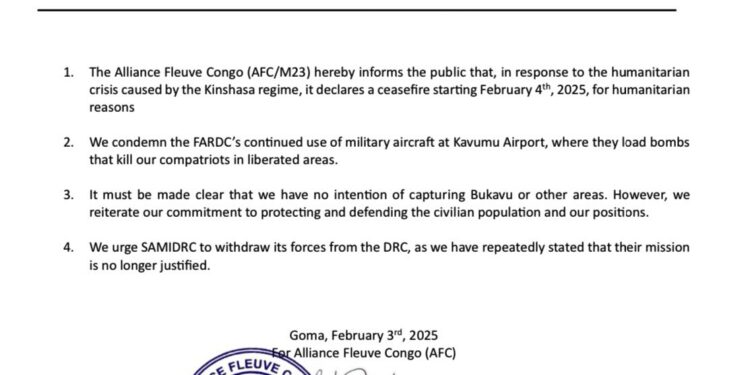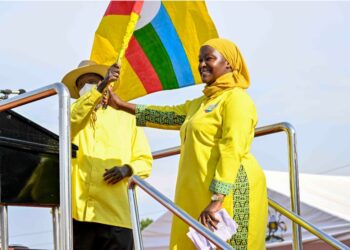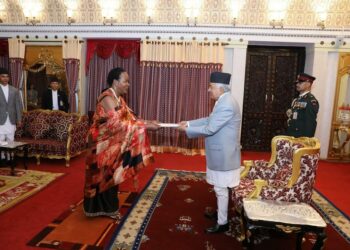GOMA – The armed group Alliance Fleuve Congo (AFC/M23) has announced a ceasefire set to begin on February 4, 2025, citing humanitarian concerns over the worsening crisis in eastern Democratic Republic of the Congo (DRC).
In an official communiqué issued from Goma, AFC spokesperson Lawrence Kanyuka stated that the decision was in response to the ongoing humanitarian catastrophe allegedly caused by the Kinshasa regime.
The ceasefire declaration comes as the conflict in North Kivu intensifies, with M23 forces having recently seized key areas, including Minova, Saké, and Goma, leading to mass displacement of civilians.
The Congolese government has accused Rwanda of backing the rebels, a claim that has been reinforced by the G7 and the European Union, who issued a joint condemnation of Kigali’s involvement in the fighting. Rwanda has repeatedly denied direct military support, insisting it is only concerned with protecting its national security.
In its statement, M23 condemned the continued operations of the Congolese Armed Forces (FARDC), particularly the alleged use of military aircraft at Kavumu Airport to load bombs targeting what they call “liberated areas.”
The rebel group also dismissed speculation that it intends to push further into South Kivu, particularly toward Bukavu. However, it reaffirmed its stance on defending its positions and protecting civilians.
The Congolese government has consistently labeled M23 as a terrorist group, citing its history of rebellion against state authority.
The group, which draws its roots from a 2012 mutiny of former National Congress for the Defense of the People (CNDP) fighters, previously occupied Goma before being defeated by a UN-backed Congolese military offensive in 2013. However, it resurfaced in 2021, reigniting conflict in the region.
M23 also called for the withdrawal of the Southern African Development Community Mission in the DRC (SAMIDRC), arguing that its presence is no longer justified. The regional military force was deployed in late 2023 to support the Congolese government in stabilizing the eastern provinces, but its effectiveness has been questioned amid growing instability.
Meanwhile, Kinshasa has insisted that both SAMIDRC and the United Nations peacekeeping mission, MONUSCO, remain key to containing the security crisis. The FARDC has continued to receive reinforcements from regional allies, including Burundi, while anti-Rwandan sentiments in DRC have grown stronger in response to Kigali’s alleged role in the crisis.
Despite the ceasefire announcement, skepticism remains about whether fighting will genuinely subside. Previous peace efforts have collapsed as both sides accuse each other of provocations. The situation in Goma remains dire, with thousands of displaced civilians seeking refuge in makeshift camps and aid agencies warning of an impending humanitarian disaster.
Do you have a story in your community or an opinion to share with us: Email us at editorial@watchdoguganda.com













